
Andre Agassi, an eight-time Grand Slam champion and an Olympic gold medalist, will be inducted into the International Tennis Hall of Fame on Saturday in Newport, R.I. Since retiring in 2006, Agassi has used the platform that tennis gave him to pursue his lifelong goal of giving children in need a better education. He founded his own school in Las Vegas 10 years ago and just forged a partnership with Canyon Capital to provide $500 million of funding for 75 charter schools across the country in the next three years.
"Andre Agassi has done more to help others than any athlete has ever done," his former coach Nick Bollettieri says. "He helped take tennis to another level, but what he is doing now with education will be so much greater because it will go on for generations and generations. This will exceed the impact he made on tennis. And this is not a one-time flash. He will continue doing it forever."
In an exclusive interview with ThePostGame.com, Agassi discusses his career, his family and his ideas on overhauling education in America:
ThePostGame: Being inducted into the Hall of Fame is probably the greatest honor any athlete can have, and it's a moment to be reflective about your life and accomplishments, both on and off the court. What have you been thinking about as you're about to be inducted?
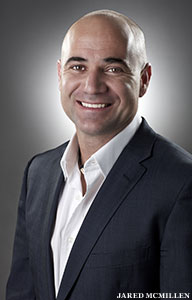
Andre Agassi: It's a moment that you're certainly very proud of. It's one of the biggest, if not the biggest accomplishment, you can have for your career being recognized for its achievements. But at the same time, it has been quite difficult for me to get my arms around. I'm not terribly sure what I'm in for, emotionally speaking. The one thing that seems obvious to me is that everyone seems unprepared for the moment, and I'd put myself in that category. I don't know that I'm prepared for this.
TPG: Some people say they're geared up to respond a certain way, but then something completely different happens once they're up there.
Agassi: Those who I've spoken to over the years, who never thought for a second that they'd get emotional, were moved by the occasion. So I'm going to allow myself the rare luxury of not trying too hard to get my arms around it, not trying too hard to make sense of it. I'm not going to allow myself to anticipate anything, because I want it to be what it is. Moments like this happen once in your life, if you're lucky.
TPG: It has been 10 years since you founded Agassi Prep. Can you tell us about the school and what you're most proud of?
Agassi: I found myself getting frustrated at the fact that I was continually being reactive to problems and not really creating systemic change in a child's life. I found myself being reactive instead of proactive. Education was always something that I felt a lack of in my life. I was lucky enough to be decent at something and to be able to take my teachers on the road with me, so to speak. And the thought always occurred to me: What about all those children who don't have the luxury of falling back on a sport that they can thrive in? What happens to their life? Where do they end up? And unfortunately they end up in rough places. Gangs. Jails. Hospitals. And morgues. When I see that, I realized I needed to give these children the tools to have a future of their own choosing. That's what led me into education.
We have a K-12 school, and we've had three graduating classes now. In all three cases, every child has made it to a university. And that's in a state where we fund second to last in the country and dead last in actually putting kids into college. So it's kind of a laboratory. It was a way for me to say, 'What if you actually have high expectations for a child? What would happen to that child?' What I've realized is that children won't fail us, but we can sure fail them.
TPG: Of all the charitable causes out there, what inspired you to focus on education?
Agassi: It's just something that started with the belief that I could give the tools as opposed to, well, it's the old adage of giving a fish or teaching somebody to fish. Education is a tool a child can use to create their own life and hopefully change the world. But once you start, you can't stop. You start with a kindergarten, a first, second and third grade. What are you going to do then? Send them back into a failing system? So I just continued with the mission, and it continues to this day. We've graduated three classes, and success is going to be these children coming back to their community and making a difference in the next generation. Success is going to be me figuring out how to scale what it is we're doing at Agassi Prep across this country. We're really on the forefront of changing inner cities in America with our latest project, so it just keeps pulling me. We spend three times more to incarcerate a man than we do to educate a boy. It's a crime to not shorten the lines that exist for a productive excellent education.
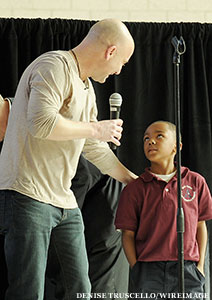
TPG: Your new project with Canyon Capital to create a fund to help charter schools sounds very exciting. How will this work?
Agassi: One of the things I've learned about charter schools, and there's about 5,000 of them in the United States, is that overall they are not high performing. There are so many mom-and-pop shops who get fed up with their options, but then get in over their heads either economically with the charter school or educationally. If you took the top 15 percent, 17 percent, of charter schools, they are incredibly high performing. So what we've decided to do is partner together and figure out a way to scale what I'm doing here in my hometown of Las Vegas and remove the single greatest impediment to the growth of those best-in-class charter school operators, and that is the facility component itself. You can access public dollars for the child's education but charter schools cannot access public dollars for their facility, so they're left to incubate in Boys and Girls Club and church basements, and it takes them a long time to stabilize their school.
I've partnered with Canyon and we've put together a fund that allows us to reach out to traditional capital, for-profit capital, and impress upon them the merit of investing in our future by building facilities for best-in-class charter school operators. We'll let them accrue their rent to a large degree until they're fully stabilized, and then help them access tax-exempt bonds that will give them the purchasing power to buy back the facility from us. This will allow them to grow at a much faster rate, and they'll buy back the facility for a price that satisfies an investor, a very moderate return. So we've reached out to investors who are like-minded, investors that know it's important to do good. It's double bottom-line investing. It's thinking outside the box to solve issues that are typically recognized as social or philanthropic or governmental.
TPG: This project is just getting underway, but can you tell us who has gotten on board already?
Agassi: Yes, Intel Capital is a big partner of ours. Citigroup is a big partner of ours. They are comfortable with their names (being out there). There are some quiet investors. We have a wide spectrum of investors from endowments to universities to just private wealth, and foundations as well.
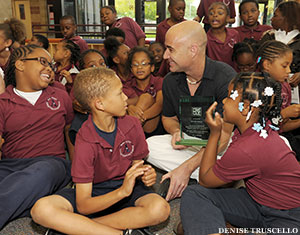
TPG: You mentioned that charter schools can't access public money for their facilities. Can you see yourself getting into politics to solve education problems from that side of the fence? How does Secretary of Education Agassi sound?
Agassi (laughing): I suppose my laugh can answer that. I'm having too much fun solving some problems right now. I've never really ever considered politics on any significant level. My interest is making a difference. I'm sure one can argue that politics at times does and doesn't make a difference. But for me, my sleeves are rolled up, and I'm too busy on the ground floor.
TPG: Right. If things are already going well, why let government goof it up?
Agassi: Unfortunately it just gets a little more complicated when you start talking about school districts, and you start talking about bigger social needs. Every time you move a lever in the educational world, it always seems like there's a stakeholder at the other end of it.
TPG: What particular teacher made a lasting impression on you, and how did he or she do it?
Agassi: I think you bring up a good point, and to digress on that point for a second I think it's clear to say that in life it's not things that impact us, it is ultimately a person that guides us and steers us. The strongest teacher in my life has been my trainer and friend and lifeguard, Gil Reyes. I would say my father was my first teacher. Then Gil. Then my wife, Steffi. Those would be the three most influential people in my life.
TPG: A balance between school and tennis can be tough. What sacrifices did you have to make?
Agassi: I had to make tennis my life. I had to give up a childhood, or at least a typical childhood. It was tennis before school. It was tennis after school. It was traveling to tournaments on weekends. It was being exhausted every Monday going into school. It was moving away from home when I was 13 to a tennis academy in Florida, which I kindly refer to as a glorified prison camp. It was turning pro at the age of 16 and traveling the world and balancing your life for 21 years with no off-season.
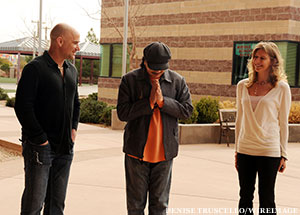
TPG: You turned pro at such a young age that didn't have the opportunity to go to college. If you had, where would you have wanted to go and what would have been your major?
Agassi: It's a good question, and the hardest part about that question, or the hardest truth in that answer, is that I'll never know. I don't know, and I'll never know, and that's the whole point. Children that don't get educated will never know who they could've been or never know what they would've chosen.
TPG: What are your kids, Jaden and Jaz, into now?
Agassi: My son is completely into baseball. Because of his interest level, he is keeping us locked down in 105 degree weather. He's in an all-star tournament here, and he continues to insist on winning, and we have another game tonight. We'd love to break away from the heat for a few days but we can't. So he's into baseball. That's his deal. My daughter loves her hip-hop bands and horseback riding. She loves her horse buddy. It's not hers, but she rides it and she thinks it's hers.
TPG: What position does your son play? What's his favorite player and favorite team?
Agassi: He loves the San Francisco Giants. And I have to begrudge Tim Lincecum because Jaden is convinced, with Tim being his favorite player, that everybody can pitch with that sort of delivery. We're doing everything we can to make sure he stays fundamentally sound. But Tim's a guy we got to meet in San Francisco at one of the games and is a sweetheart of a person. Gentle soul and certainly a great talent. Since that day, my son has been a San Francisco Giants fan and a Tim Lincecum fan, and bears the No. 55 on the back of his jersey.
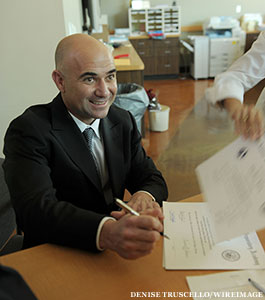
TPG: So your son is a pitcher too?
Agassi: At the risk of sounding like a proud parent, he's whatever the coach needs him to be. He's gifted and he enjoys it, so that's a good thing.
TPG: What's the general approach you and your wife take toward supporting your kids in what they're passionate about?
Agassi: First and foremost, we try to teach our kids empathy. It's important that they see life through other people's lens. And they learn more from what they see than what you tell them certainly. Secondly, we try to understand and recognize their passions and support them wholeheartedly in what their passion is. My only stipulation is that they can't change their minds at the cost of letting down anybody else. So if my son's going to play baseball and be on a team, he will be at every practice and be at every game and play what he needs to or sit on the bench, if he needs to, and will see it through, because that's important to me. It teaches him that life is a bit broader than just his own particular whims.
TPG: What's like to be on the Legends Tour with old rivals like Pete Sampras and Jim Courier?
Agassi: You always say to yourself, 'I don't ever see myself doing it.' Then you start to realize just how good the game's been to you and what a crime it is to be disconnected with the sport, given your history with it. And it's such a great environment to do it in, in the sense that we get to go to places for one night, which isn't physically too demanding for me. We get to bring tennis to places that don't have it and play well enough just to create a little nostalgia, and have an excuse to see each other again. It's a win across the board. I like the new format that Jim has created. It takes what used to be three-day tournaments and turns them into one night and two-and-a-half hours of great tennis entertainment. Four guys. Two guys play each other one set apiece, and then the finals are an elongated set with some bells and whistles. It's just a fun night of entertainment for tennis fans and for those that, hopefully, are future tennis fans.

TPG: Nadal and Federer have obviously dominated lately. What's the state of American tennis? When can we expect next great American star like you?
Agassi: I would first suggest that we've been pretty spoiled over a number of generations with American tennis from Connors and Mac to myself, Pete, Chang, Courier. There's been a lot of Grand Slams between these players, and I don't think it's always fair to think it's going to continue. It has gotten very competitive globally. If we really want to compete moving forward, we'll have to get the racket in a lot more kids' hands. But beyond that, we've figured out how to put a person on the moon, but we haven't quite figured out how to build a proper clay court in America. The game now is really morphing more toward the subtleties of shot selection and discipline and all the things that clay teaches you slightly better than hardcourt: When and how to turn defense into offense, when to start a point over, that sort of thing. Tennis is becoming much more of a slower baseline game. The serve is still big, but these guys are so fast that they can recover. It goes in phases, but we can do a few things to speed that up.
TPG: Is the lack of proper clay courts in the U.S. a matter of tradition, or is cost also involved?
Agassi: I really don't know. It's a bit startling to me to think we haven't done that yet. Green clay is considerably different than red clay. Red clay is obviously crushed brick and much slower. Green clay is very slippery, very sandy, so you get rewarded for being aggressive. On red clay, you have to choose your shots wisely. And even now at Wimbledon, with the quality of the grass or the heaviness of the balls or the athleticism at the athlete, you're seeing a lot more rallies across all surfaces. So learning subtleties of the slower game is a huge developmental necessity.

TPG: Would you advocate any rules changes to attract more fans?
Agassi: I don't know that the rules of the game are much of an issue. I think scheduling is an issue. Creating a little scarcity is always good. Off-seasons are healthy for the athlete and the fan. Understanding the importance of each tournament and there being importance on each tournament would be a huge asset. But there's so many things to consider. The sport needs to move as a whole. You can't satisfy everybody from players to tournament directors. But what you can do, hopefully, is have the game act as one unit. It would be nice to see somebody step up and lead the entire sport, even if at times, it might not go the direction that a few may want. Sometimes that's a player. Sometimes that's a tournament director. Sometimes it's a sponsor. But we need to figure out a more effective way to move as a whole sport.
TPG: Just somebody who can be a driving force.
Agassi: A commissioner of sorts. Somebody that has the power to say, this isn't going to be comfortable, but we've got to swallow it now, because then tomorrow will be a better day.
TPG: What tennis accomplishment means the most to you?
Agassi: Falling to No. 141 in the world after being No. 1, and then getting back to the top again. In one sense, I don't look at that as an accomplishment. I look at that as a reflection of good choices, of staying with something despite how daunting and Herculean of a task it appeared to be. When you get up there the first time, you don't know what's in store for you, so every day you take it as it comes. When you do it a second time, you're always aware of where you're not, and that's a scenario that can discourage you quite quickly and quite often. Pushing through those obstacles day after day to get back to the top was probably the hardest thing I did in the sport.
TPG: Could you also say that going from No. 141 back to No. 1 was a reflection of your growth as a person?
Agassi: Absolutely. I could also say it stimulated my growth as a person. It worked together. What I learned on that journey forced me to grow. But me learning forced me to take on the challenge. So it really worked together, and it was only about getting one day better. It wasn't about getting back to the top. It wasn't about my ranking. It wasn't about winning. It was about knowing that I could be one day better. That was my driving force day after day. I didn't know how far it would go, but I knew I could take the next step, and that's symbolic of life. And it's no mystery to me anymore why tennis uses the language of life. It's so reflective of maturity, of learning, of risk and rewards, and 'what I do affects what you do' and the way it causes you to be perceptive, proactive and reactive all at the same time, to problem-solve. It's a journey that teaches you a lot.
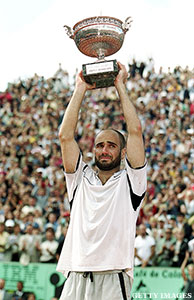
TPG: Is there one match you wished you could get a do-over?
Agassi: When I won in Paris in 1999, I knew I would never have that feeling. That was some of the joy I felt that day in getting over the hump in Paris, winning the last of the four. I knew that day I would never have a regret, despite all the regretful things that I did.
TPG: So in addition to winning, there was some purging in that moment?
Agassi: It was one of those times in my life where you just gave up, where you didn't think it was possible anymore. I was coming off a divorce. I had a shoulder injury, even though I could play. I was 29 years old, going on 30, and my body wasn't responding the same way. I had to make a lot of adjustments in my game to play on the clay. It was a microcosm of the journey I'd been on, and getting over the line in Paris was probably one of the best moments on the tennis court in my whole career, except for maybe saying goodbye.
TPG: My next question was going to be about picking one match for a time capsule, so people can watch it 50 years from now. But based on the answer to the last question, maybe you already gave me the answer.
Agassi: Time capsule? I don't know that somebody would watch that match and see all that I saw. I've played a lot of matches that I would probably prefer for others to watch. My Blake match in the quarterfinals of the U.S. Open. My Baghdatis match in the second round when I didn't know if it was going to be the last match I'd ever play. There's matches that make you sleep well at night and matches that keep you awake at night.
TPG: Anything else we should know about what you're up to these days?
Agassi: That's one of the hardest questions for me, thinking about what else I want to say, because I have too much to say.
-- For more information, go to the Andre Agassi Foundation For Education.
-- Follow Agassi on Twitter @AgassiAndre.
-- Disclosure: Agassi is an investor in Sports Media Ventures, Inc., the parent company of ThePostGame.com.
Popular Stories On ThePostGame:
-- Top 10 Athletes Searched On Yahoo! In 2011
-- Notable Sports Deaths In 2011
-- Former Marine Sets Endurance Planking Record
-- Bullying Victims Fight Back With Help From Brazilian Jiu-Jitsu Royalty







